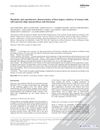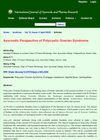 29 citations,
January 2011 in “Journal of Obstetrics and Gynaecology”
29 citations,
January 2011 in “Journal of Obstetrics and Gynaecology” Insulin resistance in women with PCOS can lead to serious health issues, but lifestyle changes and certain medications can help manage symptoms.
 18 citations,
March 2014 in “Current Pharmaceutical Biotechnology”
18 citations,
March 2014 in “Current Pharmaceutical Biotechnology” Metformin helps regulate menstrual cycles, induce ovulation, and improve pregnancy outcomes in women with PCOS.
 6 citations,
October 2010 in “Gynecological Endocrinology”
6 citations,
October 2010 in “Gynecological Endocrinology” Relatives of women with PCOS symptoms are more likely to have similar health issues.
 January 2001 in “Cambridge University Press eBooks”
January 2001 in “Cambridge University Press eBooks” Early signs of PCOS in girls, like irregular periods and polycystic ovaries, suggest a need for early diagnosis and intervention to prevent further health issues.
 277 citations,
July 2011 in “Journal of the Dermatology Nurses’ Association”
277 citations,
July 2011 in “Journal of the Dermatology Nurses’ Association” The skin's layers protect, sense, and regulate the body's internal balance, but can be prone to cancer.
 71 citations,
November 2013 in “Clinics in Dermatology”
71 citations,
November 2013 in “Clinics in Dermatology” Acne is a chronic disease linked to various systemic conditions and has significant psychological and social effects.
 69 citations,
August 2014 in “Journal of The American Academy of Dermatology”
69 citations,
August 2014 in “Journal of The American Academy of Dermatology” Trichoscopy is a quick, cost-effective tool for diagnosing different hair loss conditions.
 67 citations,
January 2013 in “Indian Journal of Dermatology, Venereology and Leprology”
67 citations,
January 2013 in “Indian Journal of Dermatology, Venereology and Leprology” Chronic Telogen Effluvium may resolve after years and is diagnosed by examining the patient's history and clinical signs, with treatment aimed at underlying causes and possibly minoxidil.
 53 citations,
February 2022 in “The Journal of clinical endocrinology and metabolism/Journal of clinical endocrinology & metabolism”
53 citations,
February 2022 in “The Journal of clinical endocrinology and metabolism/Journal of clinical endocrinology & metabolism” AMH helps estimate ovarian reserve but doesn't predict pregnancy chances; age is more important.
 36 citations,
January 2012 in “International Journal of Trichology”
36 citations,
January 2012 in “International Journal of Trichology” Losing eyelashes or eyebrows can be a sign of many different health problems and needs a careful approach to treat effectively.
 26 citations,
October 2016 in “Clinics in Dermatology”
26 citations,
October 2016 in “Clinics in Dermatology” Hormonal treatments can improve acne, but they come with potential side effects and risks.
 24 citations,
July 1987 in “Dermatologic Clinics”
24 citations,
July 1987 in “Dermatologic Clinics” Systemic diseases can cause hair loss, which is often reversible with treatment.
 15 citations,
January 2020 in “Experimental Dermatology”
15 citations,
January 2020 in “Experimental Dermatology” The document concludes that understanding and treatments for alopecia areata have significantly advanced, now recognizing it as an autoimmune disorder.
 11 citations,
November 2009 in “Sports Medicine”
11 citations,
November 2009 in “Sports Medicine” Irregular menstrual cycles in exercising women may be linked to energy deficiency or hormonal imbalances, requiring careful diagnosis for proper treatment.
 1 citations,
January 2006
1 citations,
January 2006 Hirsutism is mainly caused by high androgen levels or sensitivity, with PCOS being the most common cause.
 December 2024 in “Turkish Society of Clinical Biochemistry”
December 2024 in “Turkish Society of Clinical Biochemistry” Higher BPA levels may be linked to idiopathic hyperandrogenemia in women.
 December 2023 in “JCEM case reports”
December 2023 in “JCEM case reports” A new gene variant causes glucocorticoid resistance in a mother and son.
 November 2023 in “Frontiers in cell and developmental biology”
November 2023 in “Frontiers in cell and developmental biology” Hair aging is caused by stress, hormones, inflammation, and DNA damage affecting hair growth and color.
 January 2020 in “International journal of current research and review”
January 2020 in “International journal of current research and review” Exposure to plastics may increase the risk of irregular menstrual cycles and symptoms of hormone imbalance in teenage girls.
 January 2016 in “Springer eBooks”
January 2016 in “Springer eBooks” Pubertal acne is linked to hormonal changes, affects quality of life, and is treated similarly to adult acne.
 35 citations,
July 2015 in “Journal of Affective Disorders”
35 citations,
July 2015 in “Journal of Affective Disorders” Women with PCOS tend to have higher anxiety and depression levels compared to healthy women.
 25 citations,
January 2015 in “Advances in Psychosomatic Medicine”
25 citations,
January 2015 in “Advances in Psychosomatic Medicine” Many skin patients also have mental health issues, and doctors should treat both together.
 24 citations,
January 2015 in “Current problems in dermatology”
24 citations,
January 2015 in “Current problems in dermatology” The document concludes that accurate diagnosis of hair loss in children is crucial due to limited treatment options and the condition's psychological impact.
 13 citations,
March 2019 in “Medicina Clínica (english Edition)”
13 citations,
March 2019 in “Medicina Clínica (english Edition)” PCOS is a common hormonal disorder in women that can affect skin, fertility, and metabolism, and treatment is tailored to individual needs.
 3 citations,
January 2019 in “Cureus”
3 citations,
January 2019 in “Cureus” Hormonal imbalances in Polycystic Ovarian Syndrome (PCOS) might trigger a rare skin disorder called Confluent and Reticulated Papillomatosis (CRP), so dermatologists should consider checking for PCOS in CRP patients.
 June 2011 in “The Journal for Nurse Practitioners”
June 2011 in “The Journal for Nurse Practitioners” Up to half of adult women may experience hair loss, and doctors should use medical history, exams, and tests to find the cause and treat it.
 5 citations,
October 2022 in “Heliyon”
5 citations,
October 2022 in “Heliyon” Polycystic ovary syndrome, a disorder causing menstrual issues and infertility, can be treated with lifestyle changes, medication, herbal remedies, surgery, and assisted reproductive techniques like artificial insemination and IVF.
 3 citations,
October 1995 in “International Journal of Dermatology”
3 citations,
October 1995 in “International Journal of Dermatology” Finasteride helps treat skin issues like acne and baldness by blocking testosterone conversion.
 April 2022 in “International Journal of Ayurveda and Pharma Research”
April 2022 in “International Journal of Ayurveda and Pharma Research” Ayurveda views Polycystic Ovarian Syndrome (PCOS) as a metabolic disorder caused by an imbalance of Vata, Kapha, and Pitta, and suggests treatments like Samsodhanam, Agneya Dravyas, and Swayoni Vardhana dravyas.
 1 citations,
August 2021 in “Canadian journal of neurological sciences”
1 citations,
August 2021 in “Canadian journal of neurological sciences” Woodhouse-Sakati syndrome can cause writer's cramp and other varied symptoms, highlighting the importance of genetic testing for diagnosis.






























